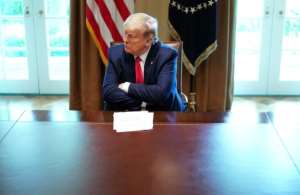
Justice isn't blind. It has eyes—and right now they are fixed on Donald J. Trump.
Nor is it true that, as the saying goes, no one is above the law. This platitude is a favorite among those applauding Manhattan District Attorney Allen Bragg for prosecuting Trump. As Bragg himself put it, in a slight twist, after Trump’s arraignment: “As this office has done time and time again, we today uphold our solemn responsibility to ensure that everyone stands equal before the law.”
These legal slogans might be inspiring. But they presuppose that "the law" is a bright, objective line and that those who cross it will be—must be—punished.
This just isn't true. Like any big, complicated human enterprise, the law is messy, ambiguous, pliable and—all too often—flat-out arbitrary.
Several examples illustrate the point. First, most crimes never land on law enforcement's radar. Felonies go unreported. Frauds go undetected. The bad guys get away. Just compare how many drivers exceed the speed limit to how many get speeding tickets.
Second, prosecutors have immense discretion regarding whether to prosecute. Given scarce governmental resources and myriad practical considerations, many potential cases aren’t pursued. Moreover, while most prosecutors are honest public servants, some aren't. Some prosecutors are biased, immoral, or more concerned with their own careers than even-handed justice.
Third, many criminal laws are ambiguous. It’s often not clear to anyone what constitutes a violation. This occasion is so prevalent that an age-old safeguard known as the rule of lenity requires that ambiguous statutes be interpreted in favor of the accused.
Finally, juries—often the final arbiter of a defendant’s fate—are frequently tainted by bias and confusion. Put simply: The verdict in any trial could easily be wrong.
Now, of course, the legal system does have some clear rules. And lots of cases are slam dunks. But the complexity and ambiguity at the margins is pronounced.
It’s naive, therefore, to simply assume that justice is being served when a prosecutor brings a case. And when a prosecutor pursues a politician from the opposing political party—as with Trump in New York—it's just as plausible the defendant is being singled out unfairly as it is the law is being faithfully applied.
There are, indeed, no shortcuts in assessing the legitimacy of a case: you have to actually look at its merits. The stark contrasts between Trump's various criminal investigations highlight this fact.
In New York, the prosecution would not have been brought against an ordinary citizen. This is a case against the man, not against his actions. The facts occurred over six years ago. No one was a victim of Trump’s acts. And Bragg’s theory rests on questionable legal grounds: It’s not clear that Trump's hush-money payments were, in fact, violations of federal campaign-finance law, as the prosecution asserts.
In Georgia, however, Trump is being investigated for pressuring state election officials to fraudulently reverse a presidential election. And Trump’s on tape arguably doing just that. Given that American democracy depends on the sanctity and accuracy of elections, this is a serious and legitimate investigation.
At the Department of Justice, Trump is being investigated for refusing to turn over classified documents to the government. While mishandling classified material is common, Trump's apparent refusal to cooperate with authorities is problematic. The government, however, must proceed with caution and should not seek prison time for Trump. A presidential election shouldn’t potentially turn on a squabble over government documents.
The DOJ is also broadly investigating Trump's attempt to overturn the 2020 presidential election and his role in the United States Capitol riot on January 6, 2021. The analysis here is different. Trump’s behavior (much of which is already public) strikes at the core of American democracy. This investigation isn’t just warranted—it's essential.
So, yes, Donald Trump should be investigated by prosecutors. Not because justice is blind. Not because no one is above the law. And not because he paid hush money six years ago to keep extramarital affairs secret. Trump should be in prosecutors' crosshairs because he tried to overthrow a presidential election—an offense against every American and a major crime under any standard of justice.
William Cooper is an attorney and the author of Stress Test: How Donald Trump Threatens American Democracy.




 Court dismisses Serwaa Amihere case against Henry Fitz, two others
Court dismisses Serwaa Amihere case against Henry Fitz, two others
 Stolen BRVs: Bi-partisan parliamentary probe non-negotiable — Dr. Omane Boamah
Stolen BRVs: Bi-partisan parliamentary probe non-negotiable — Dr. Omane Boamah
 Bawumia begins regional campaign tour on Monday
Bawumia begins regional campaign tour on Monday
 With great urgency backed by verifiable data, facts and figures dismiss COCOBOD,...
With great urgency backed by verifiable data, facts and figures dismiss COCOBOD,...
 EC’s statement on obsolete BVDs discovery “lies, half-truths, pure fantasies” – ...
EC’s statement on obsolete BVDs discovery “lies, half-truths, pure fantasies” – ...
 Nalerigu court impound vehicles of DCE, Director of Chereponi district for owing...
Nalerigu court impound vehicles of DCE, Director of Chereponi district for owing...
 Cop, 7 others grabbed over $523,000 Gold Scam
Cop, 7 others grabbed over $523,000 Gold Scam
 Akufo-Addo’s driver wins Dadekotopon NPP Parliamentary Primary
Akufo-Addo’s driver wins Dadekotopon NPP Parliamentary Primary
 Investigate, jail persons liable for GRA-SML contract – Manasseh
Investigate, jail persons liable for GRA-SML contract – Manasseh
 Lawyer wins Akan NPP Parliamentary Candidate primary
Lawyer wins Akan NPP Parliamentary Candidate primary
